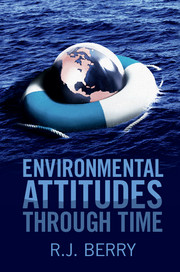Refine listing
Actions for selected content:
2285 results in Ebooks in ecology and environment
2 - No Primeval Eden
-
- Book:
- Environmental Attitudes through Time
- Published online:
- 12 April 2018
- Print publication:
- 26 April 2018, pp 20-46
-
- Chapter
- Export citation
5 - Scientific Method and the New Biology – Controlling
-
- Book:
- Environmental Attitudes through Time
- Published online:
- 12 April 2018
- Print publication:
- 26 April 2018, pp 103-131
-
- Chapter
- Export citation
1 - Choices
-
- Book:
- Environmental Attitudes through Time
- Published online:
- 12 April 2018
- Print publication:
- 26 April 2018, pp 1-19
-
- Chapter
- Export citation
10 - Reckoning, Perhaps Rueing
-
- Book:
- Environmental Attitudes through Time
- Published online:
- 12 April 2018
- Print publication:
- 26 April 2018, pp 221-241
-
- Chapter
- Export citation
8 - The Regulatory Century
-
- Book:
- Environmental Attitudes through Time
- Published online:
- 12 April 2018
- Print publication:
- 26 April 2018, pp 169-184
-
- Chapter
- Export citation

Environmental Attitudes through Time
-
- Published online:
- 12 April 2018
- Print publication:
- 26 April 2018
13 - Everyday Water Injustice and the Politics of Accommodation
- from Part III - Exclusion and Struggles for Co-Decision
-
-
- Book:
- Water Justice
- Published online:
- 26 February 2018
- Print publication:
- 15 March 2018, pp 246-258
-
- Chapter
- Export citation
10 - Indigenous Peoples and Water Governance in Canada
- from Part III - Exclusion and Struggles for Co-Decision
-
-
- Book:
- Water Justice
- Published online:
- 26 February 2018
- Print publication:
- 15 March 2018, pp 193-209
-
- Chapter
- Export citation
7 - Making Space for the Cauca River in Colombia
- from Part II - Hydrosocial De-Patterning and Re-Composition
-
-
- Book:
- Water Justice
- Published online:
- 26 February 2018
- Print publication:
- 15 March 2018, pp 134-150
-
- Chapter
- Export citation
6 - “… And Not a Single Injustice Remains”: Hydro-Territorial Colonization and Techno-Political Transformations in Spain
- from Part II - Hydrosocial De-Patterning and Re-Composition
-
-
- Book:
- Water Justice
- Published online:
- 26 February 2018
- Print publication:
- 15 March 2018, pp 115-133
-
- Chapter
-
- You have access
- HTML
- Export citation
Index
-
- Book:
- Water Justice
- Published online:
- 26 February 2018
- Print publication:
- 15 March 2018, pp 361-378
-
- Chapter
- Export citation
Part II - Hydrosocial De-Patterning and Re-Composition
-
- Book:
- Water Justice
- Published online:
- 26 February 2018
- Print publication:
- 15 March 2018, pp 107-186
-
- Chapter
- Export citation
Reviews
-
- Book:
- Water Justice
- Published online:
- 26 February 2018
- Print publication:
- 15 March 2018, pp ii-ii
-
- Chapter
- Export citation
8 - Reconfiguration of Hydrosocial Territories and Struggles for Water Justice
- from Part II - Hydrosocial De-Patterning and Re-Composition
-
-
- Book:
- Water Justice
- Published online:
- 26 February 2018
- Print publication:
- 15 March 2018, pp 151-168
-
- Chapter
- Export citation
12 - Uniting Diversity to Build Europe’s Right2Water Movement
- from Part III - Exclusion and Struggles for Co-Decision
-
-
- Book:
- Water Justice
- Published online:
- 26 February 2018
- Print publication:
- 15 March 2018, pp 226-245
-
- Chapter
- Export citation
Introduction: Hydrosocial De-Patterning and Re-Composition
- from Part II - Hydrosocial De-Patterning and Re-Composition
-
-
- Book:
- Water Justice
- Published online:
- 26 February 2018
- Print publication:
- 15 March 2018, pp 108-114
-
- Chapter
- Export citation
Introduction: Governmentality, Discourses and Struggles over Imaginaries and Water Knowledge
- from Part IV - Governmentality, Discourses and Struggles over Imaginaries and Water Knowledge
-
-
- Book:
- Water Justice
- Published online:
- 26 February 2018
- Print publication:
- 15 March 2018, pp 276-282
-
- Chapter
- Export citation
Part I - Re-Politicizing Water Allocation
-
- Book:
- Water Justice
- Published online:
- 26 February 2018
- Print publication:
- 15 March 2018, pp 33-106
-
- Chapter
- Export citation
Introduction: Re-Politicizing Water Allocation
- from Part I - Re-Politicizing Water Allocation
-
-
- Book:
- Water Justice
- Published online:
- 26 February 2018
- Print publication:
- 15 March 2018, pp 34-42
-
- Chapter
- Export citation
Copyright page
-
- Book:
- Water Justice
- Published online:
- 26 February 2018
- Print publication:
- 15 March 2018, pp iv-iv
-
- Chapter
- Export citation
